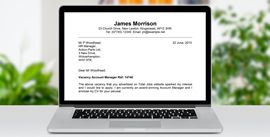The 7 Secrets of Successful CVs

You can share this article by clicking on the buttons below:
CV writing is not an exact science, and opinion as to what works and what doesn't will vary from source to source. However, there are some basic principles of the art of CV writing that are true no matter what.
Despite the name, Curriculum Vitae, which is Latin for "the story of one's life", this document should really be the exact opposite.
It must be a sales brochure for your portable and relevant talent, rather than telling the reader everything that you've ever done. If it had a mission statement, it would simply be "to raise the reader's interest and win an interview".
Over 15,000 people applied for 78 train driver jobs with Virgin on the East Coast route. So, don't underestimate how many rivals you'll be facing who may steal your interviews, because they made a better job of selling themselves on their CV.
Secret 1: Appearance
First impressions count for a lot - your CV is your handshake, is it limp and indecisive or is it firm and friendly, warming the reader to you instantly?
Whilst a lot of this is subjective, there are some ground rules that should be adhered to. Basically, does it look slung together or does it give the impression that you care and have spent the appropriate amount of time crafting it?
Have you used an easy to read font? Typically, an Arial or Helvetica font is best, as it's easy to read on a screen or printed out on paper.
The spacing between sections needs to be equal and neat. Whilst the content and layout need to be logical, presenting the information in an order that the reader will expect.
If you're unsure how to layout a CV, these CV examples will give you some useful ideas.
Employers and recruitment agencies are very busy, and prefer an easy to read CV. Make sure that yours isn't rejected straightaway, just because it doesn't look good.
Secret 2: Keep It Relevant
Target your CV at the job that you're applying for. Consider what you are selling, is it your present duties and responsibilities or your personal portable skills and achievements that an employer wants to see?
Obviously, it is your portable skills and achievements. Duties and responsibilities are not unique and could apply to anyone that was doing your job.
The opening statement, normally called the profile, is your prime selling space at the top of page one. This must be 100% relevant to the reader's needs and champion your suitability for the job you're applying for.
Avoid using generic self-praise, as everyone puts this on their CV! After all you are not going to say, "I'm rubbish at the following ..." and neither is anyone else.
Look very carefully at the job advert and make sure that you've included everything that they've asked for - most people don't do this, so you can really boost your chances of getting an interview if you do.
Secret 3: Use Compelling Language
There is a saying "Is the cup-half-full or is the cup-half-empty". They are both the same, but one sounds better than the other.
When you describe your skills, experience and achievements on your CV always make it compelling to read.
The reader of your CV may have looked at 100's of CVs before yours, most will be weak. How would you feel about the next one if you were in their shoes? Would you be positive or negative?
Always treat your CV as a sales brochure for your personal and portable talent. Pack it full of powerful and positive language, it might feel unnecessary to you, but to the reader it will make a big difference.
Be positive with everything you write and try and begin each bullet point with a power word - what sounds better "Liaised with" which could mean stood by the coffee machine once a week and had a chat to the team, or "Influenced" or "Managed", which have far more positive connotations.
A professional CV writing service can help you with the content and wording of your CV, if you don't know how to sell yourself.
Secret 4: Keep It Short and To the Point
Forget 7 page CVs, or 5 pages or even 3! The person reading your CV is likely to be disinterested and inattentive, with 100 other things to do today. So, try and keep your CV to 2 pages.
The employer / recruiter will probably make a subconscious decision on whether to interview or reject before the bottom of the first page. Whatever they read next will merely consolidate and confirm their initial impressions.
Will detailing what you did 25 years ago get them excited? Will they suddenly have a light-bulb moment when reading this and leap out of their chair shouting "Wow, I didn't realise they did that". They won't will they - so why are you writing it?
The initial audience that reads your CV may be a gatekeeper and not a decision-maker. They will not understand or be excited by industry jargon or abbreviations, so keep it simple and understand how to meet their needs.
Provide sufficient information in terms of experience, skills and achievements to really sell your suitability for the job and give them a reason to want to recommend you for interview.
Secret 5: Feed Information in a Relevant Sequence
Entice the reader with a drip feed of interesting information in the right order to slowly but powerfully win them over.
If you've been working for many years, don't put your education and qualifications at the top of page one, as the reader will want to see your employment history before your education, which should show the breadth of your experience, skills and results.
Including a list of skills at the top of page one will not be unique or make you stand out from your rival applicants and often it will be stating the obvious.
An achievements section just after the profile can make your CV more memorable, sowing the seeds of your successes, and creating real interest by drip-feeding the reader bite-sized chunks of meaty morsels in the top half of page one.
Secret 6: Tell a Story
Your CV needs a beginning, a middle and an end. Important attention-getting parts first, followed by interesting to read skills usage and finish with less relevant information, such as a driving licence (if you need to include it).
Gradually entertain the reader as they work through your CV, with maximum impact at the beginning.
At all times think how the reader will interpret what you have written - will it raise their interest and will it win you an interview invitation? If something isn't relevant, then leave it out.
There is a lot more to writing an effective CV than first meets the eye. It is not simply a list of jobs you have done with your qualifications thrown in at the end for good measure. You could be competing with 100's of rivals, you have to make your CV stand out.
Secret 7: Spellcheck Your Hard Work
There are CVs out there with Curriculum Vitae at the top of page one that is spelt incorrectly. It is not necessary to put this anyway, it's like a book with a front cover that says this is a book!
Ensure you have the correct country setting on your spell checker, using a US version is clearly not appropriate if you're in the UK.
There really is no excuse for spelling and grammatical errors in a word-processed document, as you should have used the built-in spelling and grammar checker.
It's also important to get someone else to read your CV thoroughly to check for any errors.
Make sure that you punctuate the text correctly, using commas and full stops where appropriate.
Your CV is an important document that is likely to be read by a senior person (at some point), they will reject it immediately if it has errors.
Conclusion
In short, never overlook or forget the mission statement of your CV "to raise interest and win an interview". Pack it full of compelling information written from a cup-is-half-full perspective, but not too much detail that may confuse the reader. Always use bite-sized chunks of quick-to-impress bullet points that are easy to absorb.
Share this article
You are most welcome to share this article by clicking on one of the buttons below.






